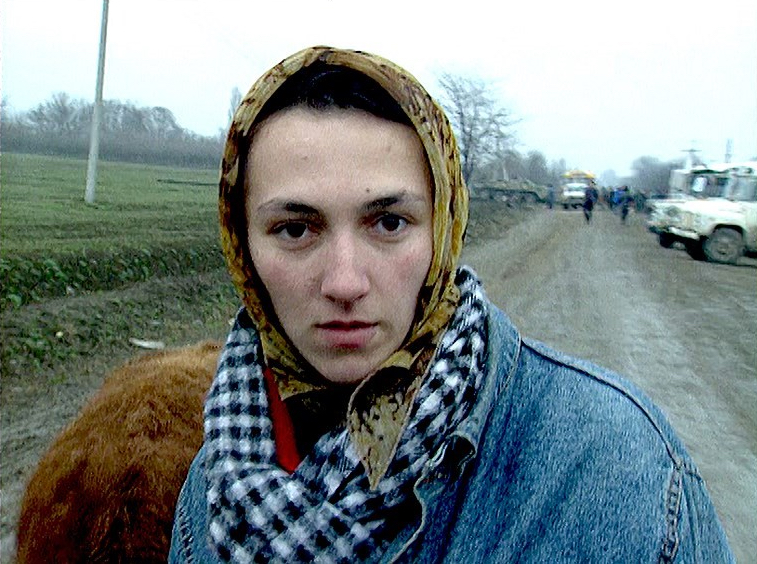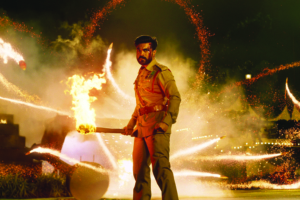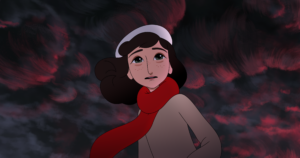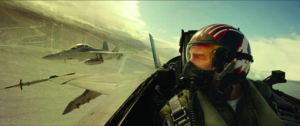A blocky, dented minibus begins to pick up speed on a dirt road as refugees are still piling in, an elderly man in a suit hanging on to the open door. As others run after the vehicle, a woman in a headscarf with her daughter in tow stops and turns to the camera to yell in fluent, unaccented Russian: ‘May the Russian Army – may all the generations of Russia – be cursed just like us.’
The scene comes from the mid 1990s, at the height of the First Chechen War, but its contemporary resonance is clear. And though it appears more than five hours into Adam Curtis’ latest BBC documentary series, it could easily serve as an encapsulation of the entire project.
Released in October 2022, Russia 1985–1999: TraumaZone covers events spanning from the USSR’s final years to the decade following its break-up. In seven hour-long instalments compiled from BBC archival footage, we see the country’s agonising slow-motion collapse; the futile attempts of its final leader, Mikhail Gorbachev, to reform the Soviet state; and the brief flicker of democratic promise under his successor, president Boris Yeltsin, almost immediately snuffed out by economic misery, pervasive corruption and a series of brutal conflicts on the periphery. The final episode ends with the uneventful and seemingly inevitable inauguration of an ‘anonymous bureaucrat’, who – spoiler alert – remains Russia’s notorious head of state to this day.
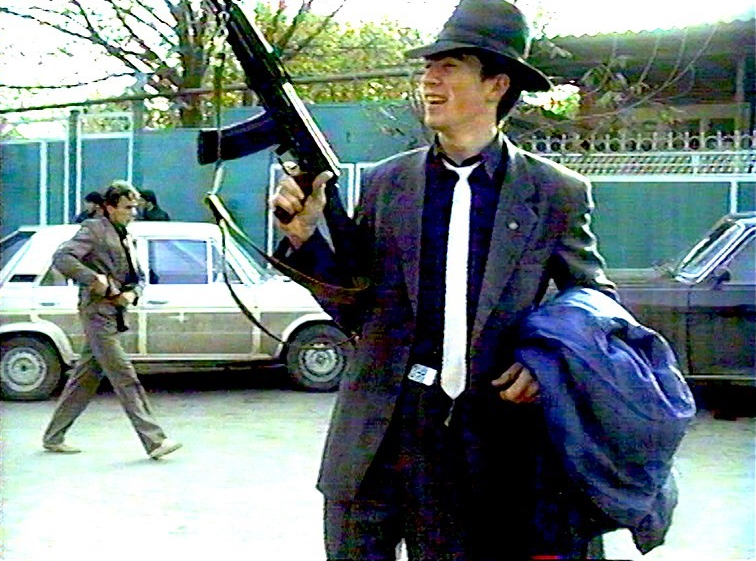
One of the documentary’s most surprising and remarked-upon features has been its radical departure from Curtis’ signature style. Viewers who come expecting to hear the filmmaker’s soothing Received Pronunciation weaving far-fetched yet convincing-sounding causal connections into a vaguely Baudrillardian narrative – over an expertly curated backdrop of shoegaze, indie and electronica tracks – will be in for a disappointment. Instead, disparate clips from the BBC’s cutting room floor are presented in roughly chronological order, jumping from the streets of Moscow to the battlefields of Afghanistan and the coalmines of Donetsk, with text captions providing only the bare minimum of context and explanation.
Often, the responses of unnamed interviewees are so poignant that it’s hard to believe they haven’t been scripted, as with the young woman who barely looks up from gluing down wallpaper to declare, ‘I don’t wish for anything; I don’t have any dreams; and, even if I did, they wouldn’t come true.’
To explain this stylistic decision, Curtis has stated that he found the material so strong that he decided to let it speak for itself[1]See Adam Curtis, ‘“They Are Stealing Russia”: Adam Curtis on How Hyper-capitalism Wrecked a Nation – and Why Liz Truss Must Take Heed’, The Guardian, 12 October 2022, <https://www.theguardian.com/tv-and-radio/2022/oct/12/russia-adam-curtis-extreme-capitalism-liz-truss-traumazone>, accessed 3 July 2023. – and, in many ways, it does. Some of the footage, such as riot police brutally attacking a peaceful protest concert in Moscow, or a child in Chechnya hysterically crying for his uncle as a soldier behind him extinguishes the fire engulfing a burning corpse, is raw and shocking; while other sequences are comically incongruous, such as bodybuilders flexing under a massive poster of Karl Marx, or a married couple using their newfound freedom of speech to shoot homemade porn. Often, the responses of unnamed interviewees are so poignant that it’s hard to believe they haven’t been scripted, as with the young woman who barely looks up from gluing down wallpaper to declare, ‘I don’t wish for anything; I don’t have any dreams; and, even if I did, they wouldn’t come true.’ And some scenes serve as their own self-contained parables: in the Monty Pythonesque clips in which a prized horse (a gift for then–UK prime minister John Major from the inaugural president of newly independent Turkmenistan, Saparmurat Niyazov[2]See Caroline Davies, ‘Papers Reveal Saga of Horse Given to John Major by Turkmenistan’, The Guardian, 28 December 2018, <https://www.theguardian.com/uk-news/2018/dec/28/john-major-horse-gift-turkmenistan-national-archives>, accessed 26 July 2023.) hilariously resists all attempts by its handlers to load it for transport, the metaphor for the former Soviet Union’s reluctant march to Westernisation is so obvious that any explanation would be borderline insulting.
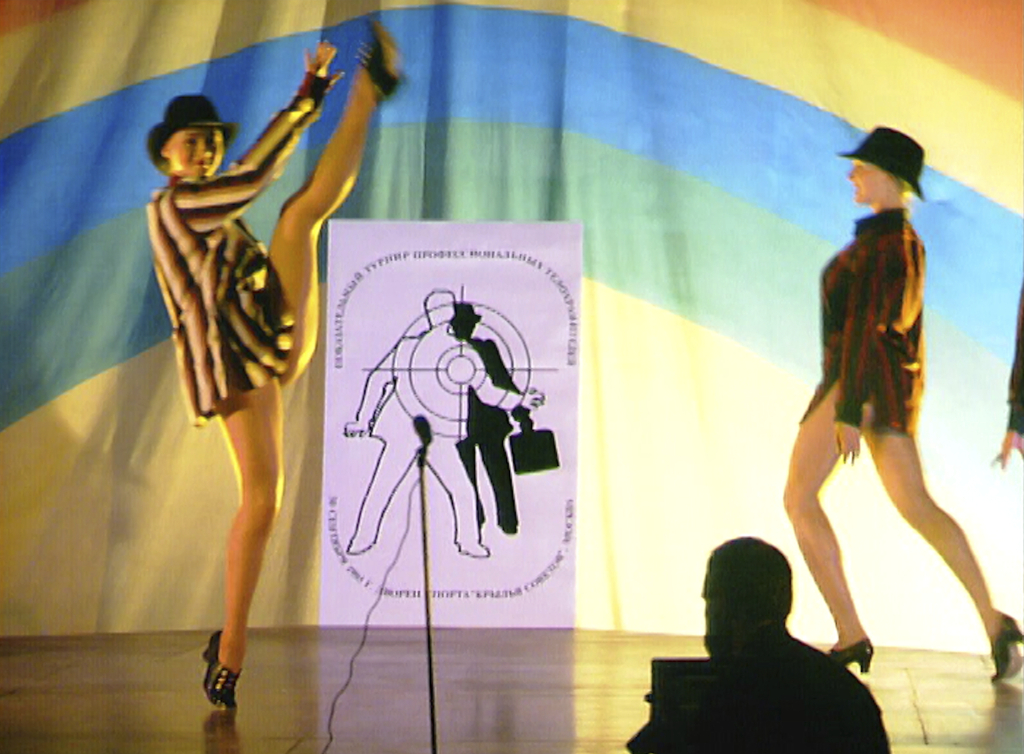
But, of course, no documentary is simply a neutral presentation of existing footage – and nor does TraumaZone claim to be such. There is always an underlying logic governing the selection of material, what is included and in what order; as film critic Roger Ebert points out in his review of Un Chien Andalou (Luis Buñuel, 1929),[3]Roger Ebert, ‘Un Chien Andalou’, RogerEbert.com, 16 April 2000, <https://www.rogerebert.com/reviews/great-movie-un-chien-andalou-1928>, accessed 3 July 2023. our minds are trained to look for causal meaning in any succession of images. Assembled as it is from previously unused footage, Curtis’ project resembles one of a sculptor cobbling together marble chips and offcuts left over from previous pieces into a new work.
So what is the image that surfaces amid the detritus? Perhaps a hint can be found in the series’ secondary subtitle: ‘What It Felt Like to Live Through the Collapse of Communism and Democracy’. Yet it is precisely here that the removal of the narrative voice becomes most problematic: without Curtis’ audible presence, the tagline appears to imply the representation of a collective subjective experience as a singular objective phenomenon, neatly packaged and presented for a Western audience. For me, having spent enough of my childhood in the Ukrainian Soviet Socialist Republic to have worn the red star of the Little Octobrists, as well as for my viewing partner, born during the immediate aftermath in the newly created Russian Federation, the effect was not so much offensive as perplexing. Was this really what it had ‘felt like’? In its very phrasing, the subtitle seems to betray a particularly Western subjectivity, posing a question that is unlikely to occur unprompted to any native Russian speaker.
With no narration to guide us, the answer emerges as much from the form as from the content. In presenting the history of 1990s Russia as a rapid-cut succession of clips jumping wildly through time, space and moods alike, Curtis seems to be attempting to emulate for Western viewers the disorienting experience of living through political and economic turmoil, the series’ disjointed and decontextualised presentation mirroring the general disorder of the era.
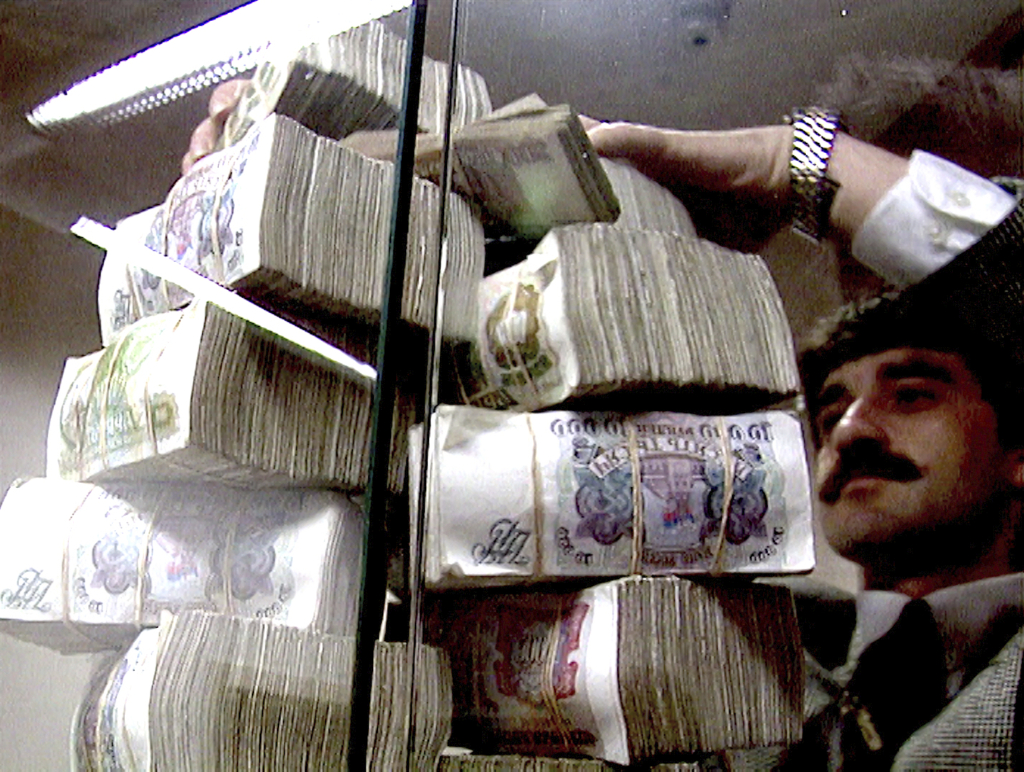
The problem is that this approach leaves us with an image of life in the post-Soviet space that is not so much incorrect as it is unoriginal: a bleak and brutal place where soulless industrialisation and rural poverty are forever anachronistically juxtaposed, where brazen corruption and shocking violence are simply facts of life, and where the extreme and incongruent absurdity of events casts a pall of bemused and cynical indifference on all within its orbit. All in all, it adds up to little more than the standard ‘crazy Russia’ cliché popularised on the Western internet for nearly two decades in a plethora of news articles, online gaming chat rooms and grainy dashcam videos compiled by shock websites. Indeed, the idea of Russia as an inherently chaotic place that defies rationalisation has long been part of the country’s own self-mythologising narrative, embodied in the words of pan-Slavist nineteenth-century poet Fyodor Tyutchev: ‘You cannot grasp Russia with your mind’.[4]Fyodor Tyutchev, quoted in TS Tsonchev, ‘Russia and the West: Fyodor Tyutchev on Russian Exceptionalism’, The Montréal Review, September 2018, <https://www.themontrealreview.com/2009/Russia-and-the-West-Fyodor-Tyutchev-on-Russian-Exceptionalism.php>, accessed 3 July 2023.
The problem is that this approach leaves us with an image of life in the post-Soviet space that is not so much incorrect as it is unoriginal: a bleak and brutal place where … the extreme and incongruent absurdity of events casts a pall of bemused and cynical indifference on all within its orbit.
Where TraumaZone does begin to approach something resembling a narrative is in tracing the economic dimensions of the USSR’s collapse and its aftermath. Curtis does a decent job of walking us through the problems of the Soviet economy, Gorbachev’s desperate and tragically belated attempts to reform it, and the disastrous privatisation that transferred the massive country’s wealth to oligarchs while impoverishing the rest of the population. We see the failures of central planning as a laundromat is forced to buy scrap metal simply to fulfil an annual quota based on renovations it has undergone years ago. The sheer scale of the problem becomes apparent as a smiling bureaucrat walks us through a suite of mostly empty offices that he proudly showcases as the source of every production decision made across the vast empire; when planners triumphantly announce the introduction of computers in the late 1980s, it becomes comical. We see Gorbachev’s well-intentioned reforms torpedoed by perverse incentives as, given a seemingly impossible task for whose failure they’re likely to be blamed, local managers use their positions to loot the factories instead, taking new cars off the assembly line and selling them to organised criminals waiting outside. And we see how an attempt to democratise the economy by distributing vouchers for shares in former state enterprises is immediately undermined by the removal of price controls, forcing all but the well connected and the well off to barter their shares away for bare necessities.
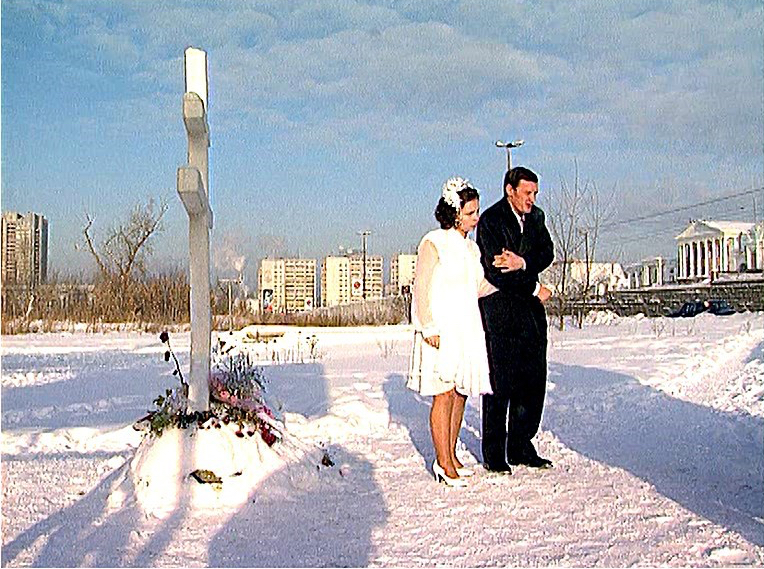
But as we’re whisked from one bleak scene to another, neither the roots of the underlying economic problems nor their specific mechanisms are adequately contextualised. This is somewhat understandable; viewers wishing to sit through a detailed explanation of Soviet economics may be few and far between. Yet, without such specifics, all we’re left with is a series of increasingly repetitive attempts to drive home the point of generalised chaos as Curtis’ stock of hyperbole proves insufficient for the task. There’s only so many times one can read captions like ‘but now the system was becoming absurd’, ‘the Soviet plan had become absurd and riddled with corruption’ and ‘the system had become dysfunctional’ before becoming desensitised. Russia, it seems, always has a bit further to fall.
Nevertheless, another narrative appears in the series almost in spite of itself, and it’s one that deserves its own documentary. Amid the failed August 1991 coup by hardline Communist Party officials seeking to undo Gorbachev’s reforms,[5]See Jonathan Steele, ‘Communist Hardliners Stage Coup Against Gorbachev – Archive, 1991’, The Guardian, 20 August 2021, <https://www.theguardian.com/world/2021/aug/20/communist-hardliners-stage-coup-against-gorbachev-russia-1991>, accessed 26 July 2023. Yeltsin’s dramatic speech in defence of democracy, delivered from atop a tank, cements the president of the Russian Soviet Federative Socialist Republic (RSFSR) as the face of popular resistance to the putsch. But it soon becomes clear that Yeltsin has ‘rescued’ Gorbachev only in order to sideline him – and he manages this feat via an extraordinarily deceptive manoeuvre. By mimicking the other republics’ ongoing independence movements and asserting the sovereignty of the RSFSR against the Soviet government – as if the former were simply another constitutive republic rather than the USSR’s undisputed metropole – Yeltsin is able to seize power without directly overthrowing Gorbachev, who is left as ‘president of nothing’.
Beyond enabling Yeltsin’s power grab, this conjuring of a distinction between Russian and Soviet rule will have long-lasting consequences. Because it allows Russian society to avoid any kind of historical reckoning with Soviet imperialism, the question of who was actually in charge of the USSR if not Russians will soon be enthusiastically answered by a proliferation of ethnonationalists, anti-Semites and conspiracy theorists. At the time, Yeltsin’s rise to power amid a parade of Russian flags was widely seen in Russia and the West alike as a triumph for democracy;[6]See Doyle McManus & Elizabeth Shogren, ‘Column One: Yeltsin’s Defiant Victory: The Flamboyant Russian President Is the Single Biggest Winner in the Political Aftermath of the Failed Coup. He Is Seen by Many as the Future of the Soviet Union’, Los Angeles Times, 22 August 1991, <https://www.latimes.com/archives/la-xpm-1991-08-22-mn-1189-story.html>, accessed 26 July 2023. today, it is hard to see it as anything other than the birth of the toxic chauvinism that has become the basis of Putin’s regime.[7]See Joy Neumeyer, ‘The Discontent of Russia’, Aeon, 5 July 2022, <https://aeon.co/essays/the-soviet-union-never-really-solved-russian-nationalism>, accessed 26 July 2023. Yet this important moment is quickly passed by and left unremarked as we continue with the procession of horrors.
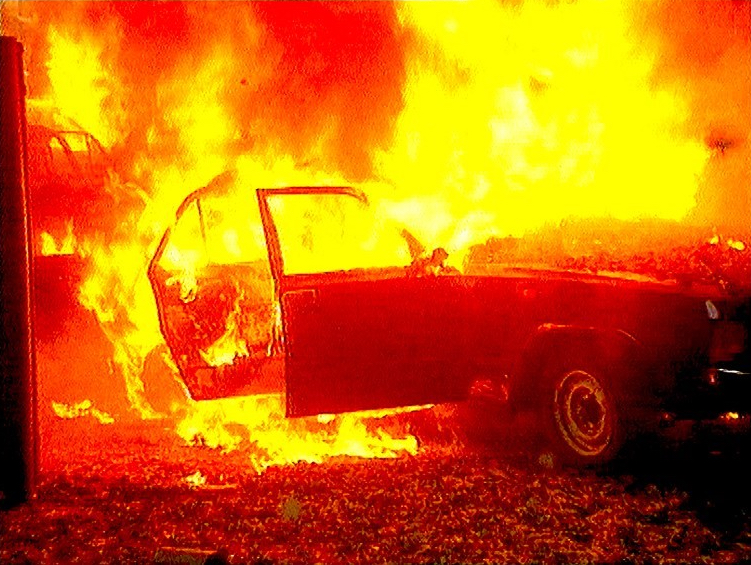
And here, perhaps, we come to the heart of the problem. With the documentary’s release occurring amid Russia’s continued assault on Ukraine, one has no option but to watch it through the lens of current events – something Curtis has encouraged in his own statements.[8]See, for example, Aris Roussinos, ‘Adam Curtis and the Death of Autocracy’, UnHerd, 7 December 2022, <https://unherd.com/2022/12/adam-curtis-on-the-death-of-autocracy/>; and Danny Leigh, ‘Adam Curtis on His New Russia Documentary: “It’s About the Weird Stew That Created Putin”’, Financial Times, 13 October 2022, <https://www.ft.com/content/9dce9754-e3d6-491e-ac3a-1b4488abd5f8>, both accessed 3 July 2023. But this link to the present imparts a social responsibility that the filmmaker’s hands-off approach simply cannot accommodate. At a time when any cultural portrayal of Russia is treated with suspicion,[9]See Sophia Stewart, ‘Pundits Weigh in on Gilbert’s Decision to Pull Russian-set Novel over Ukrainian Backlash’, Publishers Weekly, 13 June 2023, <https://www.publishersweekly.com/pw/by-topic/industry-news/publisher-news/article/92544-pundits-weigh-in-on-gilbert-s-decision-to-pull-russian-set-novel-over-ukrainian-backlash.html>, accessed 29 July 2023. one that directly seeks to evoke sympathy for its suffering in the 1990s risks the implication that this ‘humiliation’ at the hands of the West somehow justifies its aggression today – a narrative[10]See, for example, Irina Vlasova, ‘“В 90-е убивали людей”: Монеточка выпустила шокирующий клип’, Gazeta.ru, 21 August 2018, <https://www.gazeta.ru/lifestyle/style/2018/08/a_11916175.shtml>, accessed 3 July 2023. that has, indeed, been widely and successfully instilled by its government.[11]See Thomas Rowley, ‘Russia’s Wild Decade: How Memories of the 1990s Are Changing’, openDemocracy, 15 September 2017, <https://www.opendemocracy.net/en/odr/russia-s-wild-decade-how-memories-of-1990s-are-changing/>; and Nikolay Poselyagin, ‘Разломы истории: культурное пространство девяностых’, New Literary Observer, no. 120, 2013, available at <https://www.nlobooks.ru/magazines/novoe_literaturnoe_obozrenie/120_nlo_2_2013/article/10398/>, both accessed 3 July 2023. And while this is clearly not Curtis’ aim, such are the dangers inherent in his decision to eschew narration. No matter how compelling, a collection of footage cannot, in fact, speak for itself.
At a time when any cultural portrayal of Russia is treated with suspicion, one that directly seeks to evoke sympathy for its suffering in the 1990s risks the implication that this ‘humiliation’ at the hands of the West somehow justifies its aggression today – a narrative that has, indeed, been widely and successfully instilled by its government.
The risk of misinterpretation is exacerbated by the fact that, despite being the only source of context for viewers not well acquainted with the region and its history, the captions are sparse, often inadequate and sometimes even inaccurate. Episode 1 opens with scenes from mid-1980s Poland alongside shots of Soviet life, even though Poland was never part of the USSR and would follow a markedly different post-communist trajectory. Out of nowhere, single declarative sentences inform us that, ‘meanwhile’, a civil war broke out in a place that has previously never been mentioned in the documentary (and thereafter may never be mentioned again). And the fact that the series only includes Russia in its title while showing footage from places such as Ukraine and Turkmenistan perpetuates the very sort of generalisation of the Russian experience and casual elisions between Russia and other former Soviet republics that have recently come under well-deserved scrutiny.[12]An argument expressed in this Ukrainian review of Curtis’ series: Dmytro Desiateryk, ‘Гучний постріл у молоко: Рецензія на фільм Росія 1985–1999: TraumaZone’, Bird in Flight, 14 November 2022, <https://birdinflight.com/kino-3/traumazone.html>, accessed 29 July 2023. To make matters worse, key passages of dialogue are dangerously mistranslated; for example, a Chechen woman’s impassioned insistence that she will stand her ground in the face of the Russian invasion is inexplicably rendered in subtitles as ‘Glory be to the Chechen-Ingush people’. In the end, Curtis’ desire to decentre himself when dealing with such powerful material is understandable, particularly as his usual approach has long been satirised for its predictability.[13]See, for example, Chris Applegate, Twitter post dated 17 October 2016, <https://twitter.com/chrisapplegate/status/787751065315840000>; and ‘The Loving Trap’, YouTube, 18 June 2011, <https://www.youtube.com/watch?v=x1bX3F7uTrg>, both accessed 29 July 2023. But it is precisely the nature of this material at this moment in time that demands something more: not the bludgeoning of our sensibilities with traumatic images to strike home the point of how bleak and senseless life in Russia has been for the last several decades, but a clearer exploration of the reasons behind the country’s longstanding curse – along with any hint as to how it might ever be broken.
Endnotes
| 1 | See Adam Curtis, ‘“They Are Stealing Russia”: Adam Curtis on How Hyper-capitalism Wrecked a Nation – and Why Liz Truss Must Take Heed’, The Guardian, 12 October 2022, <https://www.theguardian.com/tv-and-radio/2022/oct/12/russia-adam-curtis-extreme-capitalism-liz-truss-traumazone>, accessed 3 July 2023. |
|---|---|
| 2 | See Caroline Davies, ‘Papers Reveal Saga of Horse Given to John Major by Turkmenistan’, The Guardian, 28 December 2018, <https://www.theguardian.com/uk-news/2018/dec/28/john-major-horse-gift-turkmenistan-national-archives>, accessed 26 July 2023. |
| 3 | Roger Ebert, ‘Un Chien Andalou’, RogerEbert.com, 16 April 2000, <https://www.rogerebert.com/reviews/great-movie-un-chien-andalou-1928>, accessed 3 July 2023. |
| 4 | Fyodor Tyutchev, quoted in TS Tsonchev, ‘Russia and the West: Fyodor Tyutchev on Russian Exceptionalism’, The Montréal Review, September 2018, <https://www.themontrealreview.com/2009/Russia-and-the-West-Fyodor-Tyutchev-on-Russian-Exceptionalism.php>, accessed 3 July 2023. |
| 5 | See Jonathan Steele, ‘Communist Hardliners Stage Coup Against Gorbachev – Archive, 1991’, The Guardian, 20 August 2021, <https://www.theguardian.com/world/2021/aug/20/communist-hardliners-stage-coup-against-gorbachev-russia-1991>, accessed 26 July 2023. |
| 6 | See Doyle McManus & Elizabeth Shogren, ‘Column One: Yeltsin’s Defiant Victory: The Flamboyant Russian President Is the Single Biggest Winner in the Political Aftermath of the Failed Coup. He Is Seen by Many as the Future of the Soviet Union’, Los Angeles Times, 22 August 1991, <https://www.latimes.com/archives/la-xpm-1991-08-22-mn-1189-story.html>, accessed 26 July 2023. |
| 7 | See Joy Neumeyer, ‘The Discontent of Russia’, Aeon, 5 July 2022, <https://aeon.co/essays/the-soviet-union-never-really-solved-russian-nationalism>, accessed 26 July 2023. |
| 8 | See, for example, Aris Roussinos, ‘Adam Curtis and the Death of Autocracy’, UnHerd, 7 December 2022, <https://unherd.com/2022/12/adam-curtis-on-the-death-of-autocracy/>; and Danny Leigh, ‘Adam Curtis on His New Russia Documentary: “It’s About the Weird Stew That Created Putin”’, Financial Times, 13 October 2022, <https://www.ft.com/content/9dce9754-e3d6-491e-ac3a-1b4488abd5f8>, both accessed 3 July 2023. |
| 9 | See Sophia Stewart, ‘Pundits Weigh in on Gilbert’s Decision to Pull Russian-set Novel over Ukrainian Backlash’, Publishers Weekly, 13 June 2023, <https://www.publishersweekly.com/pw/by-topic/industry-news/publisher-news/article/92544-pundits-weigh-in-on-gilbert-s-decision-to-pull-russian-set-novel-over-ukrainian-backlash.html>, accessed 29 July 2023. |
| 10 | See, for example, Irina Vlasova, ‘“В 90-е убивали людей”: Монеточка выпустила шокирующий клип’, Gazeta.ru, 21 August 2018, <https://www.gazeta.ru/lifestyle/style/2018/08/a_11916175.shtml>, accessed 3 July 2023. |
| 11 | See Thomas Rowley, ‘Russia’s Wild Decade: How Memories of the 1990s Are Changing’, openDemocracy, 15 September 2017, <https://www.opendemocracy.net/en/odr/russia-s-wild-decade-how-memories-of-1990s-are-changing/>; and Nikolay Poselyagin, ‘Разломы истории: культурное пространство девяностых’, New Literary Observer, no. 120, 2013, available at <https://www.nlobooks.ru/magazines/novoe_literaturnoe_obozrenie/120_nlo_2_2013/article/10398/>, both accessed 3 July 2023. |
| 12 | An argument expressed in this Ukrainian review of Curtis’ series: Dmytro Desiateryk, ‘Гучний постріл у молоко: Рецензія на фільм Росія 1985–1999: TraumaZone’, Bird in Flight, 14 November 2022, <https://birdinflight.com/kino-3/traumazone.html>, accessed 29 July 2023. |
| 13 | See, for example, Chris Applegate, Twitter post dated 17 October 2016, <https://twitter.com/chrisapplegate/status/787751065315840000>; and ‘The Loving Trap’, YouTube, 18 June 2011, <https://www.youtube.com/watch?v=x1bX3F7uTrg>, both accessed 29 July 2023. |
